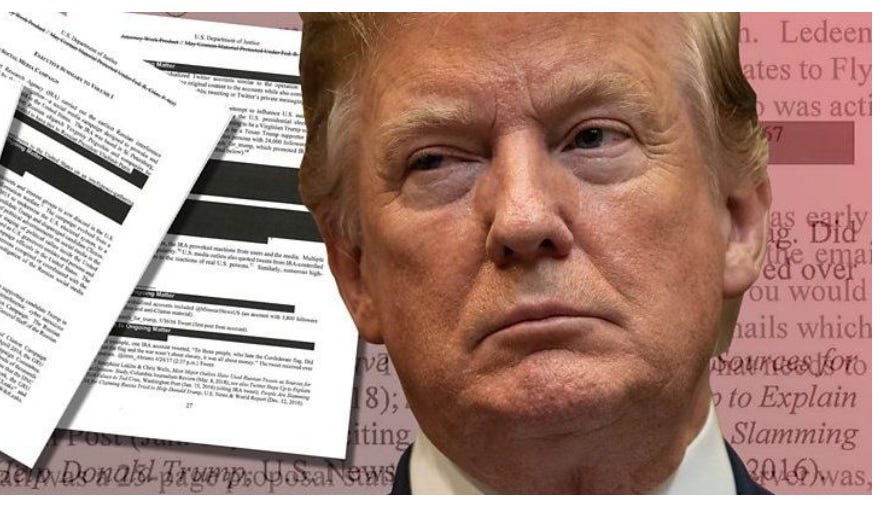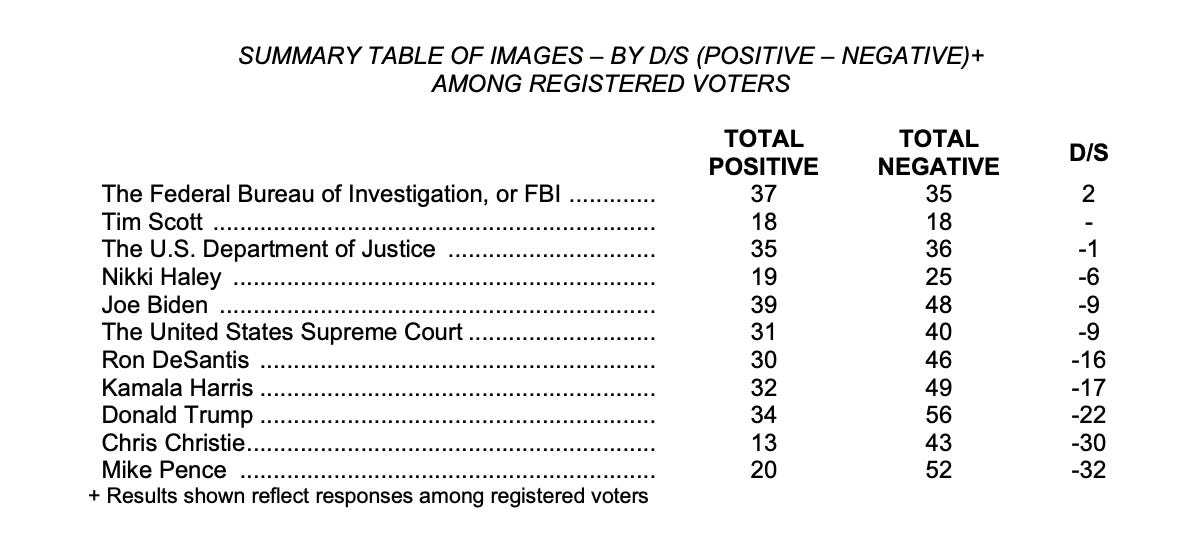The deinstitutionalization project
We can't govern based on a anti-statist philosophy and conspiracy mongering
This grilling by House Republicans of FBI Director Chris Wray this week was both extraordinary and also featured what has become a routine feature of American politics: the deinstitutionalization project.
The deinstitutionalization project involves Republicans attacking major American institutions, largely relying on conspiracy theories, with the goal of discrediting them to the point that they can take control of them.
In the hearing, Wray was accused of personally working to “weaponize the FBI against conservatives,” and of suppressing lab leak theories. He was told that January 6th was an inside job run by the FBI, that the FBI was working for a foreign power.
These are extraordinary, bizarre, and easily refutable claims made by elected officials whose job it is to ensure the accountability of our institutions. Even if you are skeptical of the FBI, the hearing saw little hope for a functional accountability process when so many of those involved were operating based on political fantasies.
The fact that elected officials in the House majority have so lost touch with reality should be the story of the Wray hearing. But if you just saw the headlines, you would not have have gauged how insane the hearing was. This represents another measure of the normalization of the deinstitutionalization project. The bizarre has become legitimate.
For context: The FBI has never been run by a Democrat. Chris Wray, a Republican official in the Bush administration, was appointed by President Trump after another Republican appointee, James Comey was deemed insufficiently loyal and fired, violating a long-standing norm that FBI officials serve a 10-year term. Wray has not become suddenly more liberal. It is the Republican Party that has changed. Wray pointed out the absurdity of the claims. But it didn’t matter. Trump and other Republicans have called for defunding the FBI. Republican Presidential candidates have promised to fire Wray.
I write about governance. And I would prefer to write about more wonky stuff like OIRA reports or Medicaid ex parte renewals. But it has become impossible to write about governance without centering the role of politics, since the deinstitutionalization project focuses on public organizations, ones which provide such basic services as education, elections, public health, defense and law enforcement. So I want to recap some of the themes feeding the deinstitutionalization project that I have previously written about.
Anti-statism
The first is anti-statism.
The political philosophy underpinning this support for Trump holds that state power is corrupt, and this corruption in turn justifies abuses of state power that Trump and supporters are promising in the future. Our victimhood necessitates our extremes. As an approach to governing, it is deeply destructive to a pluralistic democracy where parties exchange power on a routine basis.
The professionalization of conspiracy-mongering
Conspiracies are a long-time feature of American politics, especially on the right. But Trump helped to mainstream not just specific conspiracies, but the art of conspiracy-mongering as a legitimate political strategy.
In a previous era, ambitious Republican politicians would have distanced themselves from being associated with kooky theories. Now, they see it as a path to success, to becoming the next Marjorie Taylor Greene.
In a previous era, the professional class of the Republican Party, the people who end up becoming political appointees running our government, devoted some measure of effort to developing expertise that would enable them to run those institutions. Now, their path to influence is via culture wars, attacking the public institutions they hope to run.
Russ Vought is a good example. He ran Trump’s Office of Management and Budget. Out of government, he set up his own pro-Trump organization where he developed the “weaponization” trope, pushing Congress to create a weaponization committee. Republicans grilling Wray in the Judiciary Committee about weaponization were reading the script that Vought had written. The words, repeated again and again across conservative media, make the claims appear more plausible.
A well-nourished sense of victimhood is a powerful justification for all sorts of actions. “Weaponization” serves to strengthen this victimhood narrative, reinforcing the idea that the deep state is seeking to steal not just your elections, but your entire way of life. We are merely defending ourselves, justifying our radical action.
Distrust
Writing in the Washington Post, Dana Milbank noted how much Republicans pointed to the unpopularity of the FBI.
Johnson, the leadoff questioner at Wednesday’s hearing, told Wray about a recent NBC News poll in which “only 37 percent of registered voters now view the FBI positively,” down from 52 percent in 2018. “That’s a serious decline in the people’s faith, and it’s on your watch,” he told Wray. Several other Republicans joined Johnson in gloating about the FBI’s poor standing in public opinion. “We’re seeing the polling numbers,” said Rep. Barry Moore (Ala.). “The FBI is tanking.” Rep. Matt Gaetz (Fla.) taunted: “People trusted the FBI more when J. Edgar Hoover was running the place.”
The claim about FBI unpopularity should be heavily caveated. Trust in public agencies has, historically at least, maintained a basic equilibrium. Some agencies (e.g. NASA) are more popular than others (e.g. IRS). Trust might decline when an agency is in the spotlight, as the FBI is now, but it generally bounces back. And trust in government agencies declines among partisans when their President is not running the agency, feeding GOP distrust of the FBI. Finally, the same poll showed that the FBI remains more popular than Republican hopefuls for the Presidency.
But there is a sense that this time it might be different, because of the intensity of anti-statism married with the mainstreaming of conspiracy mongering. The FBI is not the type of agency that Republicans have traditionally attacked, given its conservative leanings and their law and order image. If Fox News and other conservative media keep telling the public that the FBI is out to get them, many will believe them.
The grim irony for Wray is that the Republican officials asking him to take responsibility for the FBI’s declining polling numbers are themselves more directly responsible for that loss in trust.
What is the point of this? Where does it end? The deinstitutionalization project centers on a mix of delegitimization, deconstruction and control.
These tendencies seem contradictory, and in many ways they are: undermining the trust in institutions is not a good strategy in the long run if you want to use those institutions to govern. But it is possible to see how these impulses fit together. Discrediting government provides a populist logic for disempowering those within it that they distrust, such as the career bureaucracy, and justifies asserting loyalty to narrow partisan values as a primary governing value.
This, ultimately, is the payoff of the weaponization trope: to save government, we must burn it down, and rebuild from the ashes.
The problem with this theory is that the people who want to torch our institutions do not seem remotely equipped to rebuild them, or interested in their core mission. They are more interested in using those institutions to do the things they accuse them of: imposing unpopular values on others, using instruments of power to attack their political enemies. Their accusations today offer a grim insight into the future of American governance.







